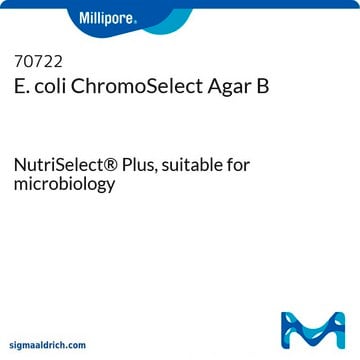62087
Levine EMB Agar
suitable for microbiology, NutriSelect® Plus
Synonym(s):
Eosin methylene Blue Lactose Agar according to Levine, Levine’s Eosin Methylene Blue Agar
About This Item
Recommended Products
sterility
non-sterile
Quality Level
form
powder
shelf life
limited shelf life, expiry date on the label
composition
agar, 15.0 g/L
dipotassium hydrogen phosphate, 2.0 g/L
eosin yellowish, 0.4 g/L
lactose, 10.0 g/L
meat peptone, 10.0 g/L
methylene blue, 0.065 g/L
manufacturer/tradename
NutriSelect® Plus
final pH
7.2±0.2 (25 °C)
application(s)
agriculture
bioburden testing
clinical testing
environmental
food and beverages
water monitoring
microbiology
suitability
selective and differential for Candida spp.
selective and differential for Enterobacter spp.
selective and differential for Enterococcus spp.
selective and differential for Escherichia coli
selective and differential for Klebsiella spp.
selective and differential for Proteus spp.
selective and differential for Streptococcus spp.
selective and differential for coliforms
Related Categories
Application
Preparation Note
Other Notes
Footnote
The designations basic, plus, or prime are added to indicate the quality control level, from basic quality control to standard QC plus to prime for full regulatory compliance.
Legal Information
Signal Word
Warning
Hazard Statements
Precautionary Statements
Hazard Classifications
Skin Sens. 1
Storage Class Code
11 - Combustible Solids
WGK
WGK 3
Flash Point(F)
Not applicable
Flash Point(C)
Not applicable
Choose from one of the most recent versions:
Already Own This Product?
Find documentation for the products that you have recently purchased in the Document Library.
Customers Also Viewed
Articles
Microbiological assessment of bacteria found in spices, a potent source for food spoilage and pathogens.
Yeast is one of the most important microorganisms known and utilised by mankind. Ancient Middle Eastern civilisations used the organism to bake bread and to produce mead, beer and wine.
Yeast is one of the most important microorganisms known and utilised by mankind. Ancient Middle Eastern civilisations used the organism to bake bread and to produce mead, beer and wine.
Yeast is one of the most important microorganisms known and utilised by mankind. Ancient Middle Eastern civilisations used the organism to bake bread and to produce mead, beer and wine.
Our team of scientists has experience in all areas of research including Life Science, Material Science, Chemical Synthesis, Chromatography, Analytical and many others.
Contact Technical Service











